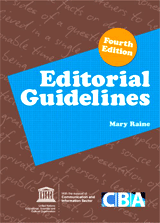UNESCO supports fourth edition of CBA’s Editorial Guidelines
15-04-2010 (Paris)

Cover page of the Guidelines
© CBA
Should pictures and stories sent to a TV station be checked before use? How to do it in a busy newsroom? Broadcasters around the world have turned in recent years to the Commonwealth Broadcasting Association (CBA) Editorial Guidelines, supported by UNESCO.
For the majority of the world’s population, particularly those belonging to disadvantaged groups, broadcasting remains the most widely accessible communication medium. It is, therefore, very important to set up and share internationally recognized professional standards.
The CBA Guidelines cover what to do when being forced to broadcast while the premises are occupied by soldiers, how to deal with phoned-in bomb threats, as well as with issues of taste, decency and religious coverage. They are compiled by Mary Raine, a highly experienced broadcasting journalist with an amazing knowledge of editorial issues. Since its first edition in 2004 the publication has contributed to improving the professional skills and practices of a large number of broadcasters, and has been translated into many languages.
Most of the chapters of the previous editions are still relevant and have been maintained in this new updated version as they relate to everlasting issues such as basic editorial principles, accuracy, impartiality, election coverage, gender and stereotyping, disaster coverage, war reporting, etc. Furthermore, new sections, covering citizen journalism and social networking sites as new tools to enhance journalism, have been added.
UNESCO’s Assistant Director-General Abdul Waheed Khan in his foreword strongly encourages “electronic media organisations and professionals to put these guidelines into practice”.
The new Editorial Guidelines will be launched at the CBA 2010 General Conference, which is taking place from 17 to 21 April in Johannesburg, South Africa.
To download the fourth edition of the CBA Editorial Guidelines click here.
The CBA Guidelines cover what to do when being forced to broadcast while the premises are occupied by soldiers, how to deal with phoned-in bomb threats, as well as with issues of taste, decency and religious coverage. They are compiled by Mary Raine, a highly experienced broadcasting journalist with an amazing knowledge of editorial issues. Since its first edition in 2004 the publication has contributed to improving the professional skills and practices of a large number of broadcasters, and has been translated into many languages.
Most of the chapters of the previous editions are still relevant and have been maintained in this new updated version as they relate to everlasting issues such as basic editorial principles, accuracy, impartiality, election coverage, gender and stereotyping, disaster coverage, war reporting, etc. Furthermore, new sections, covering citizen journalism and social networking sites as new tools to enhance journalism, have been added.
UNESCO’s Assistant Director-General Abdul Waheed Khan in his foreword strongly encourages “electronic media organisations and professionals to put these guidelines into practice”.
The new Editorial Guidelines will be launched at the CBA 2010 General Conference, which is taking place from 17 to 21 April in Johannesburg, South Africa.
To download the fourth edition of the CBA Editorial Guidelines click here.
Related themes/countries
· Media Development
· Weekly newsletter
Share this story:
Contact information
- UNESCO
Source














